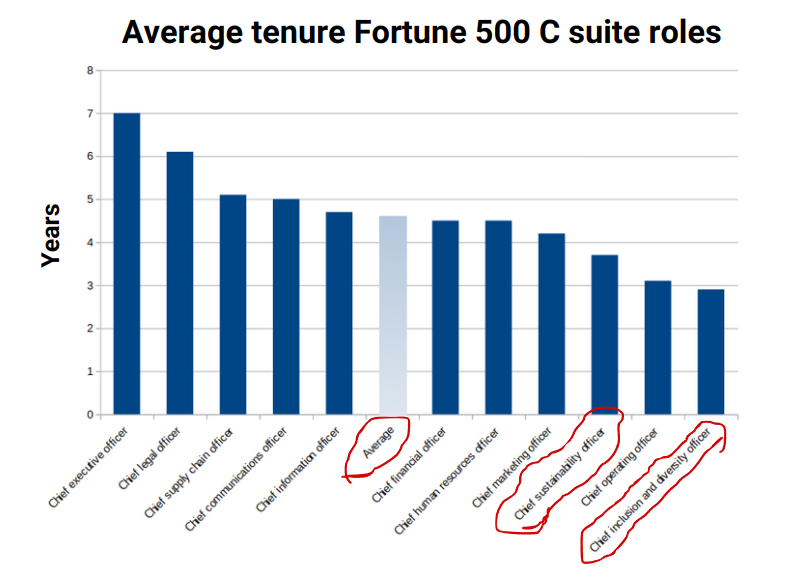
Sunday Brunch: is there a doctor in the house? (or why sustainability's a tough gig)
The CSO as the curator of sustainability expertise and driver of change
An article published in Eco-Business in December 2023 was titled "15 things that frustrated Chief Sustainability Officers in 2023." 15 things!
Those frustrations ranged from confusion about what their role actually would involve to the external stressors on ESG - political and legal in North America and the tsunami of rules (for example of greenwashing) in Europe, Australia and other countries.
The fear of getting sued has led to an almost 'compliance paralysis'.
Being a sustainability specialist and leader is a tough gig.
A survey carried out by Lotti Hawkins, who at the time was a recruiter at Farrell Associates, found that going into 2024 only 17% of her 400+ respondents felt good or energised and half felt burnt out.
I'm sure we have all heard anecdotes that echo the above. Let's look at some more data.
The data below is from a SpencerStuart report and is a snapshot of the Fortune 500 companies as at 30 June 2023. You can see that the average tenure of C suite sustainability officer roles is below the average for C suite roles.

Of course there is a big caveat here in that the roles of Chief Sustainability Officer (CSO) and Chief Inclusion and Diversity Officer are relatively new and so conclusions on tenure are perhaps premature. In addition, less than 60% of the companies had a CSO (or equivalent) or a Chief Inclusion and Diversity Officer albeit that is higher than previous years and steadily improving.
But what about sustainability specialist roles more broadly, not necessarily at the C suite level?
The average tenure of sustainability specialists in US-based recruitment consultant Zippia's database (~300 people) is only 1-2 years.
So what is going on here? What is driving this turnover and the underlying dissatisfaction?
In a completely nonstatistical way I’ll discuss this in today's Sunday Brunch referring to two analogies, one which I have already discussed in a previous Sunday Brunch and the other which is the title of today's.
So is there a doctor in the house?
If you are not a member yet, to read this and all of our blogs in full...

Owner of the largest leech farm in Europe
In the second season of Blackadder, set in Elizabethan times, the eponymous hero of the show, Edmund Blackadder visits a doctor seeking a remedy for his infatuation with his new servant 'Bob'. After a brief examination the doctor recommends a course of leeches. This was the epitome of medical treatment at the time. As Blackadder exclaims:
"A leech on my ear for ear ache, a leech on my bottom for constipation."
One leech to cure them all.(1)
Thankfully medical knowledge has developed somewhat since then with the complexities of how the human body works and interacts with its environment (including other people) better understood.
Whilst there is a strong argument for looking at health holistically, there will be times where expert advice is needed.
If you have twisted your knee you wouldn’t go to a cardiologist.
The term sustainability covers many many disciplines. It is impossible to be an expert in every aspect of sustainability. At the Sustainable investor we write on four broad themes:
- Greener energy
- Transitions / Human rights
- Built environment / wellness
- Agriculture / natural capital
There are so many areas of expertise across those topics. Even within greener energy someone expert in battery technology is not going to understand all of the nuance of thermal engineering (boilers, heat pumps etc).
We rely on experts in different fields all the time and feature writers from different specialisms. For example Rob Karparti on artisanal mining, Kristina Touzenis on human rights law and Rufus Grantham on place-based impact.
And yet, there can be a mismatch of expectations that in recruiting a sustainability person that person will have all the expertise in sustainability from subject matter to regulation to compliance to disclosure. That is simply not going to be the case.
For a CSO perhaps the strategic nature of role encompasses curating the right expertise and embedding it in the appropriate function?
That leads us onto my second analogy.
Form(al expertise) over Function
The second analogy is one that I have already used in a previous Sunday Brunch: "Is disclosure the exam technique of sustainability?"
I used studying for (and passing exams) to illustrate a point about sustainability strategy and disclosure. Exams (and coursework) are valuable in providing an efficient way of demonstrating a degree of skill but the balance has to be made in their approach. Exam technique is important in allowing a student to effectively demonstrate their knowledge but that knowledge and understanding needs to be there in the first place.
To pass our school exams we need to know the subject matter but we also need to be able to apply it in an exam - exam technique. We actually need both but sometimes there can be too much focus on the exam technique bit without actually increasing knowledge.
Sustainability needs to be part of an organisation's strategy.
But strong reporting on and tracking of ESG initiatives also improves risk reduction and value creation feeding back into the strategic plan. It educates the business.
Bottom line, the two go side-by-side. They are an inseparable pair.
You can read the full blog here 👇🏾

This second analogy points to another problem that I see. Sustainability is mostly seen as a function rather than an area of expertise that applies to all functions.
"I need you to do the sustainability. You know the sustainability thing. New regulation coming out? Bring me the sustainability person so they can do their sustainability thing."
When it comes to sustainability from a corporate perspective, there has been a heavy focus on disclosure as recent years have seen an acceleration in the implementation of frameworks and standards requiring management and operational teams to provide new disclosures. ISSB S1 and S2, CSRD, SFDR, TCFD and Nasdaq’s Board Diversity Rules are just a few examples of requirements that have either been finalised or became mandatory just in 2023! One of the frustrations for Sustainability heads is that they have been increasingly pushed into dealing with what is coming down the track - a compliance rather than strategic function.
But sustainability reporting should really be done by the reporting team utilising disclosure guidelines in the same way that financial reporting standards are used for producing the financial statements and annual reports. They have sustainability expertise relevant to the function they are executing.
So what should be the role of the CSO then?
The role of the Chief Sustainability Officer
My colleague Steven wrote an excellent article for Farrell Associates called "The evolving role of a Chief Sustainability Officer." You can read it here👇🏾

An important conclusion from the article is that when a candidate is applying for a CSO role, the most important question they should ask is the one that will determine how much difference they can really make: who will I report to?
The role of the head of sustainability or CSO should be in my view to curate expertise and drive change within the organisation primarily at the board level, ensuring sustainability expertise is with the teams that need it from reporting to ops to the board itself.
Does that mean they should know everything there is to know about sustainability? No but the should have enough of an overview to ask the right questions and know where to get that expertise.
So could it be that the frustration felt by CSOs and other sustainability leaders (as well as anyone working in the sustainability field) is the expectation gap between what is needed both by employers, employees and stakeholders and an over simplification of what 'sustainability' actually is?
In my view the two biggest gaps are
- thinking that sustainability is a function rather than expertise that needs to be curated into all of the key functions in an organisation, but each of those functions executes that task, for example sustainability reporting is done by the reporting team.
- misunderstanding that sustainability encompasses a broad range of expertise.
On that last point, I used a medical analogy to highlight that in medicine you wouldn't go to a cardiologist for a twisted knee. However there will be times when you would need the counsel of experts in multiple fields. For example, establishing a treatment plan for bowel cancer requires an oncologist, a radiologist, a pathologist, a gastroenterologist, a stoma care nurse, a physiotherapist, an occupational therapist and a psychologist all brought in at different times into a multidisciplinary team.
In the same way a CSO can coordinate the multidisciplinary team for sustainability, thinking about the area holistically.
Historically there has been an expectations gap between what an organisation thinks a CSO is capable of and what the organisation needs them for. But that gap is closing.
Note (1): Hmmm Lord of the Rings but in the style of Blackadder...
Something a little more bespoke?
Get in touch if there is a particular topic you would like us to write on. Just for you.
Contact us
Please read: important legal stuff.


